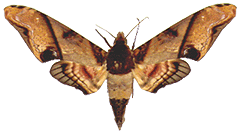|
Amplypterus panopus Cramer
Sphinx panopus Cramer. 1779, Uitl. Kapell., 3: 50.
Compsogene panopus Cramer; Rothschild & Jordan, 1903: 189.
|

Amplypterus panopus 
(.65
natural size)
|
Diagnosis. This is a striking species which can only be confused with
its only congener, A. mansoni Clark, illustrated by Diehl (1980). A.
mansoni has a much more irregularly fasciated hindwing, and narrower
forewings that are paler, more unicolorous, less pink, with a more even,
narrower, less angular, dark marginal band. It has not been recorded from
Borneo, though it occurs in Peninsular Malaysia and Sumatra.
Geographical range. Oriental tropics to Philippines, Sulawesi and Java.
Habitat preference. Harman (1981) found the species to be frequent mainly
in forest areas, though the few specimens taken on G. Kinabalu and during
the Mulu survey were in open habitats.
Biology. In Java the larva is greyish green, granular, with a yellow
subdorsal line and seven oblique yellow lateral bands (Dupont & Roepke,
1941). A rare form is yellow with reddish brown oblique bands. The horn is
very long and smooth, slightly upcurved. The Indian larva illustrated by
Bell & Scott (1937) is similar, generally paler green dorsally.
Recorded host-plants (Bell & Scott, 1937; Dupont & Roepke, 1941;
Barlow, 1982) are: Dracontomelum, Mangifera, Rhus (Anacardiaceae);
Durio (Bombacaceae);
Calophyllum, Garcinia, (Guttiferae).
<<Back
>>Forward <<Return
to Contents page
|

